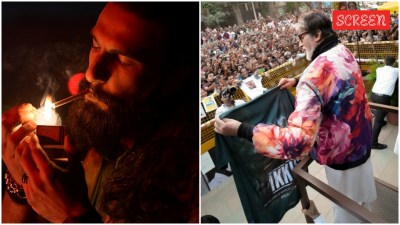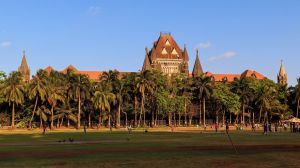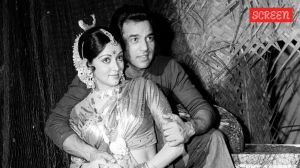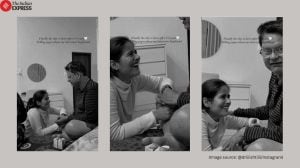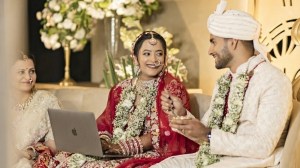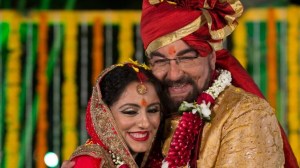‘Manmohan Singh was helpless about the house, could neither boil an egg, nor switch on TV’
“Friends would send their children to Manmohan for guidance. No matter how busy, he always found time… Yet nothing of the sort would happen at home. He knew little of what was on in our lives,” writes daughter Daman Singh.
 Former PM Manmohan Singh and his wife Gursharan Kaur release a book on their life, 'Strictly Personal', written by their daughter Daman Singh (L), in New Delhi on Sept 14, 2014. (Express archives)
Former PM Manmohan Singh and his wife Gursharan Kaur release a book on their life, 'Strictly Personal', written by their daughter Daman Singh (L), in New Delhi on Sept 14, 2014. (Express archives)Excerpts from STRICTLY PERSONAL: MANMOHAN AND GURSHARAN
By Daman Singh
Publishers Harper Collins India
College
Hindu College was a lively place… Economics was a subject that appealed to Manmohan immediately. ‘I was always interested in issues of poverty, why some countries are poor, why others are rich’…
In his final year, Manmohan was elected class representative. His friends then encouraged him to contest the election for the president of the students’ union. This he did, and was promptly defeated.
Both of us laugh at his having lost his very first political battle…
Cambridge
In those days student applications were routed through the Indian High Commission in London… The Punjab National Bank, Akali Branch, Amritsar, certified that the candidate’s father was in a sound financial position… And Dr Naranjan Singh of Railway Road, Hoshiarpur, declared that Manmohan was ‘physically and mentally fit to travel to foreign countries’…
Manmohan was seldom seen in female company. According to a close friend there was a stage when he was occupied with the thought of a certain girl. But when his supervisor remarked that his latest essay was not as good as it should have been, he was mortified and vowed never again to be swayed from his ultimate goal.
Marriage
Gursharan Kaur had no preference for any profession. All she wanted was a good-looking husband who liked music (she used to sing)…
Manmohan was quite a catch… Gursharan was the first serious candidate on their list… He thought she was very pretty, ‘bholi-bhali (innocent)’, somewhat shy…
 Former Prime Minister Manmohan Singh, with his wife Gursharan Kaur, being honoured at Golden Temple during a 2016 visit. (Express archives)
Former Prime Minister Manmohan Singh, with his wife Gursharan Kaur, being honoured at Golden Temple during a 2016 visit. (Express archives)
But just to be on the safe side, he went to Khalsa College to have a chat with the principal. Upon being told that the girl he was thinking of marrying was an ‘average student’, he was more than satisfied…
UN stint
Like his father, my father insisted that guests be entertained in the finest tradition of Indian hospitality. So my mother slaved away in the kitchen…
I now turn to my father and ask him severely if he felt sorry for the amount of work she had to do. ‘Yes,’ he says meekly…
‘Did you help out at all?’ I enquire. He is most indignant. ‘Of course! I helped her wash the dishes’…
My mother definitely liked being in New York. But my father was ambivalent. The late 1960s were somewhat troubling times… ‘The reason (we moved back) was that your father said that we have three daughters… It’s better to bring up girls in our own country rather than in America.’
Finance Ministry
Needless to say, government rules of conduct were meant to be ruthlessly followed… Parochialism, nepotism and all shades of favouritism were to be shunned… Somewhere along the way he retreated from family affairs…
He was completely helpless about the house and could neither boil an egg, nor switch on the television. Due to unknown reasons, he was unable to regulate the pace of his walk. Once he took off he would charge forward at top speed… A cold simply had to be pneumonia, and a twinge of pain anywhere above the waist was surely a heart attack…
He was at his best with young children whose language skills were limited. Older children foxed him completely… We simply accepted that our father was differently abled. It was therefore our duty to humour, reassure and protect him…
One evening, a security guard arrived to inform us that our dog Penu was at the prime minister’s residence. I was marched through the back gate of 1 Safdarjung Road… There was no sign of Mrs Gandhi…
Penu insisted on being walked umpteen times a day. My father was on the night shift. It was quite an experience to watch him shooting by in the dark, hanging on grimly to the leash, one hand clamped desperately over his turban…
The daughters
Kiki (the eldest daughter, Upinder) was admitted to English literature, economics as well as history honours at St Stephen’s College. She decided to go with history.
Though my father had declared all along that the decision was hers to make, he made it quite clear that it was the wrong one. Like very many economists, he had a fairly low opinion of social science disciplines other than his own…
 Former Prime Minister Manmohan Singh with his wife Gursharan Kaur (L) and their daughter Upinder Singh (R). (Express archives)
Former Prime Minister Manmohan Singh with his wife Gursharan Kaur (L) and their daughter Upinder Singh (R). (Express archives)
When it was my turn to go to college in 1981… I took mathematics. It seemed a noble and romantic thing to do. My father was pleased… After three years in St Stephen’s College… I applied to the Institute for Rural Management, Anand… This time he was not pleased…
Amu (Amrit, the youngest daughter) was the only one to follow in his footsteps. After St Stephen’s College, she won a scholarship to St John’s at Cambridge, and then to Nuffield College at Oxford… But halfway through her PhD, Amu suddenly crossed the Atlantic and enrolled at Yale. This took him completely by surprise… But this time he chose his words with care…
Over the years, various friends would send their children to my father for inspiration and guidance. No matter how busy he was, he always found time for this and even seemed to enjoy it.
Yet nothing of the sort would happen at home. He had very little idea of what was going on in our lives… But for his three daughters, even if his lack of time was excusable, his lack of engagement was not.
Religion
Kiki was strongly against organized religion… I was happy to believe whatever she did. I was around thirteen when she explained to me that there was no God… I was relieved…
All three of us grew up fairly ignorant about our own religion.. At some point in time we stopped wearing the karha… For us, Sikhism was mostly about not cutting one’s hair…
I mention this to my father. ‘Yes,’ he says indignantly. ‘Very little was done… I thought it was your mother’s job.’ My mother gives a derisive snort…
Over one dinner, Kiki told our father that she wanted to get married. Vijay Tankha taught philosophy… My father stopped eating, thought for a moment, and asked her when… I had to explain that it would have been more appropriate for him to ask to whom…
My parents had no real reason to believe that any of us would marry a Sikh… Over time, the awkwardness receded…
Six years later I married Ashok Patnaik… This time there was no question of keeping the wedding a secret… In 2004, Amu would marry Barton Beebe in a civil ceremony in New York. Everyone was perfectly delighted.
Photos
- 01
- 02
- 03
- 04
- 05


